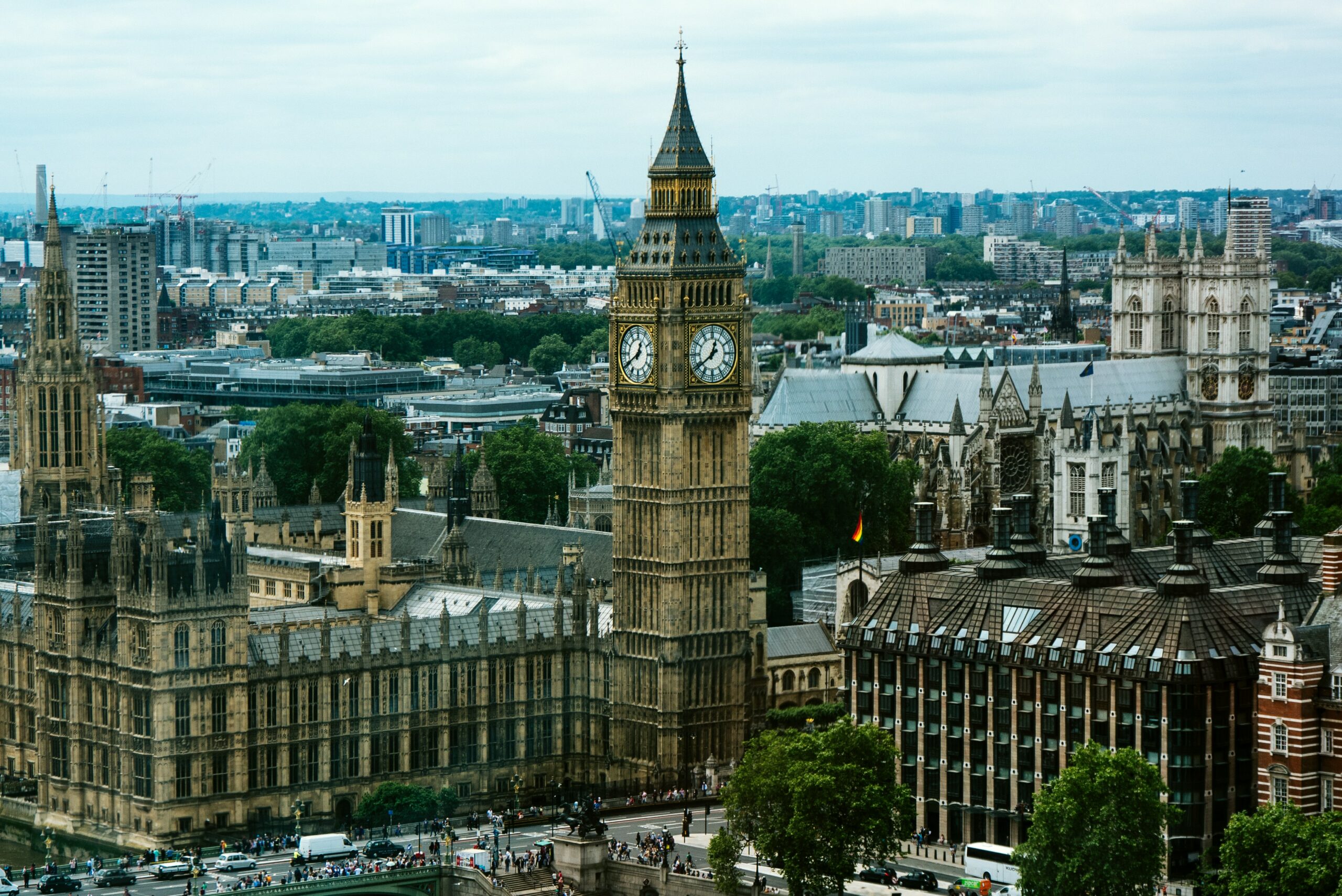By endorsing a Republican candidate over the Democrats and “campaigning” for the Tories over Labour, India has riskily waded into partisanship in both countries. Could the BJP’s wholehearted backing of the Tories and Democrats risk damaging India’s long-term interests?
Brexit-hit Britain is on the cusp of its third general election since 2015. Even while the political deadlock over the Brexit saga continues, an unlikely issue thousands of miles away from Britain is complicating the election further – the Indo-Pakistani impasse over Kashmir in the aftermath of India’s abrogation of Article 370 with the ensuing divisions of the subcontinent finding their way into British domestic politics.
In the backdrop of India’s clampdown in Kashmir, Britain’s Labour Party passed an emergency resolution in September referring to Kashmir as a disputed territory undergoing a humanitarian crisis and demanding the right to self-determination for its people. This has naturally not gone down well in India, which dreads foreign interference into what it considers its internal affairs.
Labour’s standing amongst the British Indian diaspora has already taken somewhat of a hit – many traditional Labour voters have been shifting towards the Conservatives (also called the Tories). In 2010, 30 percent of British Hindus voted for the Conservatives, while in 2017, this figure rose to 40 percent. In contrast, almost 90 percent of the Pakistani diaspora vote Labour.
Ab Ki Baar Boris Sarkar?
Prime Minister Modi’s innovative diplomacy has uniquely addressed the Indian diaspora, holding massive events in foreign countries, and in turn linking the diaspora to domestic politics in India. This diaspora outreach now appears to be paying off to the BJP’s advantage.
Labour’s resolution has resulted in parts of the Indian diaspora embarking on an explicit mobilisation campaign to urge Indians to vote Conservative. This campaign involves over 100 Indian diaspora outfits with the Overseas Friends of the Bharatiya Janata Party (OFBJP) at its forefront – an overseas advocacy group with 40 global chapters aiming to connect the Indian diaspora with India’s ruling BJP party. A multi-pronged strategy of social media messaging and community outreach is being deployed involving rumours referring to Labour as anti-India and a mouthpiece of the Pakistani government.
The Labour Party appears to have succumbed to this pressure and backtracked from its stance by diluting its criticism of India’s actions. The Pakistani diaspora too has been politically active in pushing voters to choose Labour.
Is India Meddling in Britain’s General Elections?
The OFBJP’s explicit aims of targeting 40-48 marginal seats and swing votes there in the Conservative party’s favour has raised more than a few hairs, despite denials of allegations of political designs by its President Shekhawat.
Foreign interference in elections is a hot topic, especially in the context of allegations of Russian interference. Of course, lobbying on behalf of the interests of particular ethnic groups isn’t new in countries like the U.S. Powerful lobbies such as the Israeli, Saudi and indeed the Indian lobby are all known in their attempts to steer American politics in favour of the interests of their native countries. But a “campaign” that explicitly targets the ousting of Labour MPs to replace them with Tories raises legitimate concerns.
Many of the OFBJP members, who are quite literally canvassing on behalf of the Tories against Labour, are also members of the Hindu Swayamsevakh Sangh which is the global offshoot of the Rashtriya Swayamsevak Sangh – the ideological parent of the BJP. British author Peter Jukes compared their campaign to Russian interference, calling it “illegal”.
But will Kashmir matter to South Asian voters?
Foreign policy isn’t often a central issue on voters’ minds during elections with domestic issues seemingly more important. However, given the numerical strength of the South Asian diaspora in the UK – 1.5 million of whom are of Indian origin and 1.1 million of Pakistani origin – their influence and political mobilisation, the highly emotive issue of Kashmir could play a role in the electoral choices of many.
Some watchers opine that Labour’s perception amongst many people of Indian origin in the UK as Hinduphobia and appeasing to Muslims could diminish their votes. Others find this unlikely for many reasons – the diversity of Britain’s constituencies, the diversity of the Indian diaspora itself (comprising 44 percent Hindus, 22 percent Sikhs and 12 percent other religions, out of which many come from East Africa), and the fact that immediate issues such as Brexit, education, healthcare and taxation could be more important.
Additionally, India’s “vote bank politics” – the assumption that voters view themselves exclusively through an identity lens and can thus consolidate an electorate – may not hold true for Britain’s South Asians. But as voiced by Conservative MP Baker, for the 1 million out of 1.1 million Pakistani diaspora community that hails from Mirpur in Kashmir, this isn’t a foreign policy issue but one directly impacting their loved ones.
The Risks of Partisanship
During the Howdy Modi event in Texas, Prime Minister Modi made an unprecedented appeal to the Indian-American community to vote for President Trump in next year’s American elections. His words “Ab ki baar Trump sarkar” (this time a Trump government) – a twist on his own 2014 campaign slogan “Ab ki baar Modi sarkar” – echoed through the halls of the packed NRG stadium.
By endorsing a Republican candidate over the Democrats and “campaigning” for the Tories over Labour, India has riskily waded into partisanship in both countries. Blatantly supporting one party against another has its obvious risks. The natural question to then ponder is: Could the BJP’s wholehearted backing of the Tories and Democrats risk damaging India’s long-term interests? What happens if Labour comes to power in Britain or the Democrats win next year’s American elections?
Of course, close ties with India have overall bipartisan support in the U.S. and Britain. India’s rise is linked to the advancement of American interests, and Brexiteers often tout the freedom to exercise alleged British pragmatism and sign their own trade deals, unshackled from the EU’s complex bureaucracy, as motivation for Brexit. A potential UK-India Free Trade Agreement (FTA) has been important in this thought process. But this blatant political posturing on India’s part risks hitting more than a raw nerve of the opposition parties in both Britain and the U.S.
In October’s U.S. Congressional hearing on Human Rights, the Democrats did not hesitate in critiquing India’s clampdown in Kashmir. Realising the risks of such a strategy, India’s External Affairs Minister Jaishankar attempted some damage control through his statement: “We have a very non-partisan approach to domestic U.S. politics.”
Also, while the Tories may support India’s Kashmir position, their more rigid stance on immigration, compared to Labour’s, is antithetical to India’s interests. Although some policies, for instance, towards foreign students, which particularly impacted Indian students in Britain, have been reversed, immigration continues to remain a thorn in the India-EU FTA negotiations. Besides, even elements within the Tories have raised Kashmir concerns, not least British Prime Minister Johnson himself. One naturally wonders then if narrowing the lens of viewing India’s foreign relations merely through the Kashmir prism is wise.
Is Kashmir a National Security Issue for Britain?
The Kashmir problem is undoubtedly polarising South Asians in the UK. A number of violent protests in London this year by pro-Pakistan demonstrators that desecrated the Indian High Commission and even injured people have already exposed the serious ramifications of the Kashmir issue on inter-communal harmony in Britain.
At a Chatham House event, UK’s former National Security Adviser Lyall Grant mentioned, “The issue of Kashmir poses security risks to the UK.” Given that majority of Britain’s Pakistani community is Kashmiri, coupled with the ongoing risks of the ideologies of global terrorist groups like ISIS and Al-Qaeda penetrating the minds of European Muslim youths, this statement may not be far-fetched.
Furthermore, certain Muslim majority countries appear to have newfound interests in Kashmir. Scholar Abhinav Pandya elaborates how Kashmir is becoming a new battleground for the Saudi-Iranian proxy war and how Turkey is using Kashmir as a rallying cry to unite Muslims to fulfil its own political ambitions.
My article in Haaretz espoused concerns of the Kashmir issue leading to potential radicalisation amongst British Muslims. The latest terrorist attack in Britain, carried out by Usman Khan of Pakistani Kashmiri origin, is a grave reminder of the continuous threat of extremism in Britain.
How India manages the situation in Kashmir going forward is critical. Otherwise, the stories of disaffection that emerge could become part of the narrative of perceived victimhood – often a pull factor in potential radicalisation.
Poetic Justice?
The manifestation of Hindu nationalist ideology, as well as of Pakistani nationalism and Kashmiri separatism in British politics, is adding to the fault-lines in a country already struggling with the fallout from Brexit. The communal rhetoric that has long plagued the subcontinent, with its roots in the traumatic partition of India in the aftermath of British rule, seems to have substantively arrived in the UK.
The December 12 general election aims to find a solution to the Brexit deadlock. It is ironic then that at least some voters will have issues far removed from Britain on their minds while casting their ballots. As I stated previously in The Diplomat, “The irony of the unresolved messes resulting from British colonialism in the subcontinent coming to haunt present-day Britain is unmissable and can best be described as poetic justice.”
Shairee Malhotra is the Foreign Affairs Editor of Freedom Gazette and the 2020 South Asia Fellow of the Young Professionals in Foreign Policy program. She has previously worked with the European External Action Service - the official foreign policy arm of the European Union and has an MA in International Relations from Queen Mary University of London.


